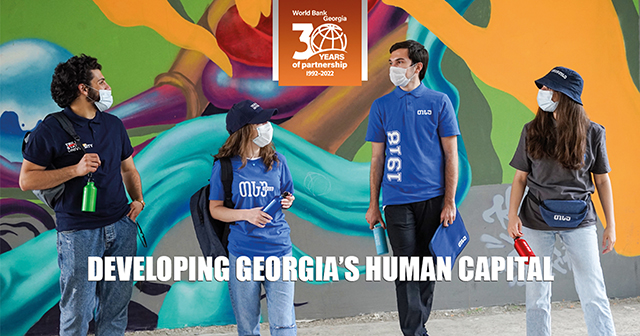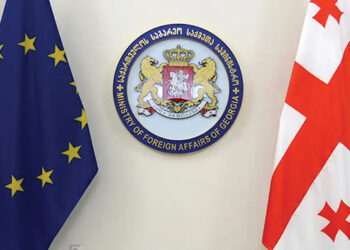Georgia’s potential for economic prosperity has received a significant boost with the March 22 approval by the World Bank Board of Executive Directors of the ‘Human Capital Program for Georgia.’ Financing to the amount of $400 million will be the largest cross-sectorial investment ever extended to Georgia by the World Bank over the 30 years of its partnership.
The World Bank’s Program for Results (PforR) in Georgia will be the first financing instrument of its kind anywhere to comprehensively improve education, health, and social protection outcomes. It is also the first time Georgia is applying this instrument of World Bank financing to any sector.
“This is indeed an unprecedented Program for both Georgia and the World Bank, and it illustrates that investing in people, especially in youth, is the number one priority for the Bank, as well as for the Georgian Government,” said Sebastian Molineus, World Bank Regional Director for the South Caucasus.
“Only by unlocking the full potential of its human capital, by ensuring access to high-quality education for the next generation, and by delivering equal healthcare and social protection services for all citizens, can Georgia build a solid foundation for inclusive and sustained growth, which provides better jobs and opportunities for its people.”
The Georgia Human Capital Program aims to improve the quality of life for all citizens of Georgia with fair and equal access to high quality education, better targeted social benefits, and strong preventive healthcare with lowered cost of treatments and medicine.
“Acknowledging the critical significance of investments in education, health, social protection and jobs for the long-term development of the country, the human capital development is one of the highest priorities for the Government of Georgia. Investing in human capital and, in this way, deploying innovative solutions is especially crucial in the time of Covid-19, to protect human capital outcomes, close equity gaps and alleviate negative effects of the pandemic in a more consistent manner,” said Lasha Khutsishvili, Minister of Finance of Georgia. “I would like to emphasize that we deeply appreciate this valuable support from the World Bank and look forward to our continued fruitful cooperation.”
Only by unlocking the full potential of its human capital, ensuring access to high-quality education, and by delivering equal healthcare and social protection services for all citizens, can Georgia build a solid foundation for inclusive and sustained growth
The health and social protection dimension of the Human Capital Program will contribute to increasing the efficiencies of service delivery and will promote the inclusion of vulnerable groups in health, social, and employment services. The reforms are expected to improve the social assistance coverage of poor households with children, and to better prepare and connect the unemployed to job opportunities. The Program will help the Government to reform health service purchasing and pricing, improve efficiency and equity in the pharmaceutical market, and transform and strengthen primary health as well as hospital care in Georgia.
The main objective of the education reforms supported by the Human Capital Program is to upgrade the skills and competencies of Georgia’s children and youth to better tackle increasingly complex problems that face modern societies. From Pre-School through High School to University and beyond, the Program will support the transformation of Georgia’s education system from mere knowledge provision to developing capabilities of problem-solving, collaboration, and communication. The Program will do this through a fundamental reform of the financing and organization of the education system. Students will have access to better facilities and teachers and school authorities will receive better and closer support in all regions of Georgia. The digital education infrastructure, from Tbilisi through to the most remote mountain-top village, will be made more robust and resilient.
From Pre-School through High School to University and beyond, the program will support the transformation of Georgia’s education system from mere knowledge provision to developing capabilities of problem-solving, collaboration, and communication
The program also showcases Georgia’s commitment to the global climate change agenda. Due to its mountainous geography, Georgia is particularly vulnerable to climate change-related crisis events. Together with short term mitigation actions, like reduced greenhouse gas emissions and energy efficiency in schools, the Program supports the development of concerted climate change action by all individuals. The program envisages modules on climate change and energy efficiency in environmental education, training teachers and holding workshops on climate resilient and energy efficient schools, as well as promoting access to skill training necessary for green jobs.
***
Sebastian Molineus, the World Bank Regional Director for the South Caucasus: The World Bank’s Board of Executive Directors on March 22 approved a what I believe to be a truly transformational Human Capital Program for Georgia. And I say transformational for three reasons: First of all, this is the single largest investment that the World Bank has ever conducted here in Georgia, in particular, focusing on better human capital outcomes.
Second of all, it’s the first time that we actually use a new financing instrument called the “Program for Results”, which measures impact by the ability to actually achieve outcomes, which I think is an instrument that is typically is used for higher income countries and again, is a testimony to Georgia’s many advances that it has made over the past few years.
And third and finally, in fact, it’s the first time that the World Bank itself has used the “Program for Results” (PforR) instrument for the human capital agenda, cutting across education reforms, social protection reforms and health reforms as well.
We at the World Bank believe that human capital is truly at the essence in the core of the economic growth model for countries in general, but also for a country such as Georgia. Indeed, we believe it’s critical for Georgia to help it overcome what we refer to as the middle income trap, to help forge a path to undertake some difficult structural reforms to one day become a high income country.
And indeed, with Georgia’s recent EU membership application, these reforms will prove to be critical to ensure that the education system, health system and social protection systems are in line with EU, the EU key laws and regulations and standards as well.
This Human Capital Program will have a transformational impact on Georgia. Number one – we believe it’ll be transformational to further improve the targeted social assistance, making sure that vulnerable groups in Georgia, in particular, families with children receive targeted social assistance. We also believe that it’s critical for ensuring for better health outcomes in particular, primary care, but also lowering the very high out of pocket costs for inpatient treatment, but also for medicines that we know exist here in Georgia. Third, and finally, we aim with this Program to dramatically improve health and education outcomes, to ensure that the next generation is prepared and equipped for a next generation of jobs and skills that will be required to succeed in the modern economy.
So again, my sincerest congratulations, and thank you to the Government for pioneering what I believe, as I said before it to be a transformational program, and the World Bank stands 100 percent behind this very important reform that will have a positive impact for the people of Georgia.”















